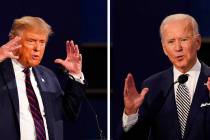Constitution must protect even ‘outrageous’ speech
The question is: Where does one person's free speech fist end and another's private nose begin?
On Wednesday, U.S. Supreme Court Justice Sonia Sotomayor essentially posed that question to the attorney for the father of Marine Matthew Snyder, whose funeral was picketed by the homophobic Phelps family's Westboro Baptist Church.
"If I am talking to you as a Marine, if you were a Marine," Sotomayor asked, "and I was talking about the Iran war (Iraq, perhaps?) and saying that you are perpetuating the horrors that America's doing and said other things that were offensive, would you have a cause of action because you are being called a perpetrator of the American experience?"
Plaintiff's attorney Sean Summers reasoned there is a difference between public speech directed at a public figure and public speech directed at a private figure.
Outside the Snyder funeral, church members had carried signs reading "God Hates the USA," "Fag troops," "Semper fi fags," and "Thank God for dead soldiers." This boorish and vile behavior apparently is their way of protesting the military's policy of "don't ask, don't tell" and what they see as federal tolerance of homosexuality.
At one point, a jury awarded Albert Snyder $11 million because the pickets and a subsequent Internet posting constituted "intentional infliction of emotional distress." The 4th U.S. Circuit Court of Appeals threw out the judgment as a violation the First Amendment.
The case has attracted widespread and intense interest. Amicus briefs in support of Snyder were filed by 48 attorneys general, including Nevada's own Catherine Cortez Masto. Forty U.S. senators -- including Nevada's own Harry Reid -- signed on as well.
In a letter announcing the senators' amicus filing, Reid said, "The brief will argue that the law should continue to protect, as it long has, the rights of all private persons -- including the families of fallen soldiers -- to mourn their loved ones at a peaceful and solemn funeral."
Actually, the Westboro protesters complied with police directions and kept a distance from the church. The father never saw them in person, only later on television. He subsequently learned a church member had written something on a website, and he found it.
It is the content of the speech that is in question, not the disruption. Just outside the door of the church were people carrying flags and signs that read "God bless America."
Does the right of Westboro to address a public issue end when it offends a mourning father, family and friends?
During the arguments, rookie Justice Elena Kagan further bored in by quoting from a ruling in which the high court found Hustler magazine had a First Amendment right to publish a vulgar cartoon depicting preacher Jerry Falwell: "Outrageousness in the area of political and social discourse has an inherent subjectiveness about it which would allow a jury to impose liability on the basis of the jurors' tastes or views or perhaps on the basis of their dislike of a particular expression."
Though Kagan did not quote it, the opinion goes on to say, "An 'outrageousness' standard thus runs afoul of our longstanding refusal to allow damages to be awarded because the speech in question may have an adverse emotional impact on the audience. ... (T)he fact that society may find speech offensive is not a sufficient reason for suppressing it. Indeed, if it is the speaker's opinion that gives offense, that consequence is a reason for according it constitutional protection. For it is a central tenet of the First Amendment that the government must remain neutral in the marketplace of ideas."
Still, Falwell was a public figure. Arguably, the Snyders are not.
Margie Phelps, a daughter of the church founder, argued for Westboro, "I believe that the umbrella of protection under the First Amendment that this court has established firmly is speech on public issues. Sometimes you get under that umbrella because it's a public official or it's a public figure, but the umbrella that you give the protection for is speech on public issues."
Summers countered that the church's message was personal and targeted at the family.
Of which Kagan asked: "So does that mean that now we have to start reading each sign, and saying 'war is wrong' falls on one side of the line but 'you are a war criminal' falls on another side of the line? Is that what we would have to do?"
Both must be under the umbrella.
Thomas Mitchell is editor of the Review-Journal and writes about the role of the press, the First Amendment and access to public information. He may be contacted at 383-0261 or via e-mail at tmitchell@ reviewjournal.com. Read his blog at lvrj.com/blogs/mitchell.























